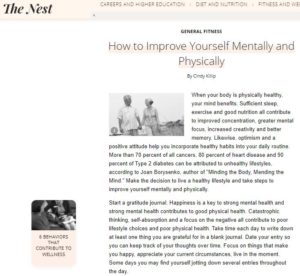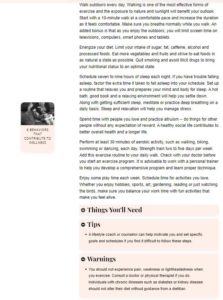
When your body is physically healthy, your mind benefits. Sufficient sleep, exercise and good nutrition all contribute to improved concentration, greater mental focus, increased creativity and better memory. Likewise, optimism and a positive attitude help you incorporate healthy habits into your daily routine. More than 70 percent of all cancers, 80 percent of heart disease and 90 percent of Type 2 diabetes can be attributed to unhealthy lifestyles, according to Joan Borysenko, author of “Minding the Body, Mending the Mind.” Make the decision to live a healthy lifestyle and take steps to improve yourself mentally and physically.
Tips
- A health/lifestyle coach or counselor can help motivate you and set specific goals and schedules if you find it difficult to follow these steps.
Items you will need
- Journal
- Walking shoes
Step 1
Start a gratitude journal. Happiness is a key to strong mental health and strong mental health contributes to good physical health. Catastrophic thinking, self-absorption and a focus on the negative all contribute to poor lifestyle choices and poor physical health. Take time each day to write down at least one thing you are grateful for in a blank journal. Date your entry so you can keep track of your thoughts over time. Focus on things that make you happy, appreciate your current circumstances, live in the moment. Some days you may find yourself jotting down several entries throughout the day.
Step 2
Walk outdoors every day. Walking is one of the most effective forms of exercise and the exposure to nature and sunlight will benefit your outlook. Start with a 10-minute walk at a comfortable pace and increase the duration as it feels comfortable. Make sure you breathe normally while you walk. An added bonus is that as you enjoy the outdoors, you will limit screen time on televisions, computers, smart phones and tablets.
Step 3
Energize your diet. Limit your intake of sugar, fat, caffeine, alcohol and processed foods. Eat more vegetables and fruits and strive to eat foods in as natural a state as possible. Quit smoking and avoid illicit drugs to bring your nutritional status to an optimal state.
Step 4
Schedule seven to nine hours of sleep each night. If you have trouble falling asleep, factor the extra time it takes to fall asleep into your schedule. Set up a routine that relaxes you and prepares your mind and body for sleep. A hot bath, good book and a relaxing environment will help you settle down. Along with getting sufficient sleep, meditate or practice deep breathing on a daily basis. Sleep and relaxation will help you manage stress.
Step 5
Spend time with people you love and practice altruism — do things for other people without any expectation of reward. A healthy social life contributes to better overall health and a longer life.
Step 6
Perform at least 30 minutes of aerobic activity, such as walking, biking, swimming or dancing, each day. Strength train two to five days per week. Add this exercise routine to your daily walk. Check with your doctor before you start an exercise program. It is advisable to work with a personal trainer to help you develop a comprehensive program and learn proper technique.
Step 7
Enjoy some play time each week. Schedule time for activities you love. Whether you enjoy hobbies, sports, art, gardening, reading or just watching the birds, make sure you balance your work time with fun activities that make you feel alive.
References
- Minding the Body, Mending the Mind; Joan Borysenko
- Learned Optimism: How to Change Your Mind and Your Life; Martin Seligman
- ACE Advanced Health & Fitness Specialist Manual; American Council on Exercise
- National Sleep Foundation: How Much Sleep Do We Really Need?
About The Author
Cindy Killip is a medical exercise specialist, health coach, author and speaker who has been teaching and writing about exercise and wellness since 1989. She authored the book Living the BONES Lifestyle: A Practical Guide to Conquering the Fear of Osteoporosis [2012]. Killip holds multiple certifications through the American Council on Exercise and degrees in communications and sociology from Trinity University with a focus on pre-med and exercise science/lifetime fitness. She attended graduate school studying exercise physiology at the University of New Mexico.


Article originally published on AZCentral: http://healthyliving.azcentral.com/improve-yourself-mentally-physically-15187.html



